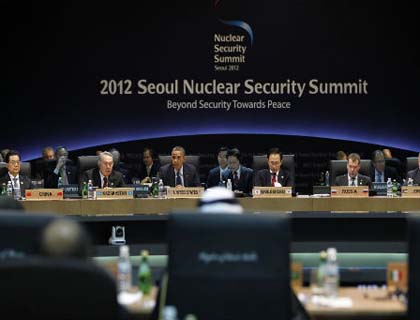SEOUL - World leaders including US President Barack Obama called Tuesday for strong steps to combat nuclear terrorism, wrapping up a 53-nation summit overshadowed by North Korea's planned rocket launch.
"Today we have set a new milestone in making the world a safer and more peaceful place," South Korean President Lee Myung-Bak, who hosted the summit, said at the end of the two-day event.
The leaders from 53 nations, including China's Hu Jintao and Pakistan's Prime Minister Yousuf Raza Gilani, called in a communiqué for steps to minimize civilian use of highly enriched uranium (HEU), which can be used to make bombs.
They also called for safeguarding world stockpiles of HEU and plutonium, and tightening security of radioactive material that could be used to create a "dirty" bomb.
"Nuclear terrorism continues to be one of the most challenging threats to international security," the leaders said in the communiqué. "Defeating this threat requires strong national measures and international cooperation."
The North's nuclear and missile ambitions were not officially on the agenda, but they were the focus on the sidelines and for Obama throughout his three-day visit to South Korea, a close US ally.
The North stole some of the limelight right up to the end, releasing a statement just before the close of the summit snubbing demands from Obama and other leaders to scrap a satellite launch planned for April.
Obama had repeatedly denounced the rocket launch, which is seen by the US and its allies as a disguised ballistic missile test.
The US leader had stressed his country was not hostile to the North's people but was scathing about its leaders' record and urged them to "have the courage to pursue peace".
North Korea responded by announcing it would go ahead with what it calls a peaceful satellite launch and told Obama to drop his "confrontational mindset".
"The US head of state said he had no hostile intention towards us," said a foreign ministry spokesman quoted by the official KCNA news agency.
"But if that remark is genuine, he should abandon the confrontational mindset that tries to block us, and should have the courage to admit that we have as much right to launch our satellite as other countries do."
Obama earlier Tuesday focused on the nuclear threat from "non-state actors" and not the North.
"The security of the world depends on the actions that we take," he said in a speech to delegates at the start of the day.
Obama in 2009 declared his vision of a world without nuclear weapons and the following year hosted a Washington summit, aimed at securing or destroying the world's stocks of plutonium and HEU by 2014.
"We are fulfilling the commitments we made in Washington. As a result, more of the world's nuclear material will never fall into the hands of terrorists who would gladly use it against us," Obama said.
"What's also undeniable is that the threat remains... it would not take much -- just a handful of so of these materials -- to kill hundreds of thousands of innocent people."
But as a consequence of the Seoul summit, "more of our citizens will be safer from the danger of nuclear terrorism", Obama declared.
Highlighting the threat, an Interpol representative told the session there was "lots of evidence" that Al-Qaeda would use nuclear weapons if it had them, according to German delegation sources.
Interpol said there were 3,000 cases in 119 countries in which nuclear material had gone missing.
China's Hu, in his opening speech, noted good progress since 2010 but said the situation "remains grave".
He said his country would deepen cooperation with the UN nuclear watchdog and help countries that want to convert reactors from HEU fuel to low enriched uranium.
Lee said the world still has some 1,600 tons of HEU and 500 tons of plutonium -- enough to make more than 100,000 nuclear weapons.
Leaders also tackled the threat posed by loosely guarded radioactive material in hospitals and other sites.
On Monday France, Belgium, and the Netherlands -- three of the world's top suppliers of medical isotopes -- announced plans eventually to phase out the use of HEU in the production process, under a deal with the United States.
Experts said modest progress had been made in Seoul but cautioned many of the tough issues to fully solve the problem had not been addressed, with countries unwilling to make binding and transparent agreements. (AFP)

